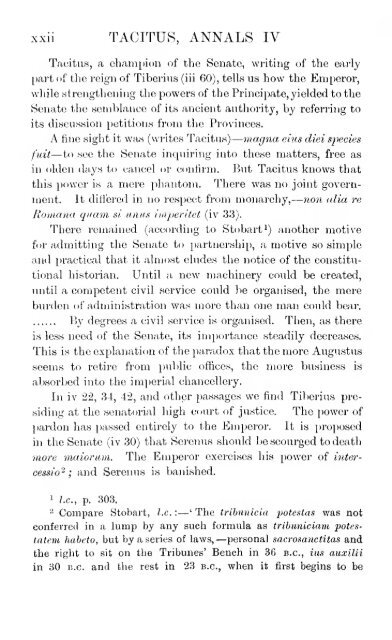You also want an ePaper? Increase the reach of your titles
YUMPU automatically turns print PDFs into web optimized ePapers that Google loves.
xxii TACITUS, ANNALS IV<br />
<strong>Tacitus</strong>, a chamjiion <strong>of</strong> the Senate, writing <strong>of</strong> the early<br />
part <strong>of</strong> the reign <strong>of</strong> Tiberius (iii 60), tells us how the Emperor,<br />
while strengthening the powers <strong>of</strong> the Principate, yielded to the<br />
Senate the semblance <strong>of</strong> its ancient authority, by referring to<br />
its discussion petitions from the Provinces.<br />
A fine sight it was (writes <strong>Tacitus</strong>) magna eius diei species<br />
fuit— to see the Senate inquiring into these matters, free as<br />
in olden days to cancel or confirm. But <strong>Tacitus</strong> knows that<br />
this power is a mere phantom. <strong>The</strong>re was no joint government.<br />
It differed in no respect from monarchy, non alia re<br />
Romana quam si wrms imperitet (iv 33).<br />
<strong>The</strong>re remained (according to Stobart^) another motive<br />
for admitting the Senate to partnership, a motive so simple<br />
and practical that it almost eludes the notice <strong>of</strong> the constitu-<br />
tional historian. Until a new machinery could be created,<br />
until a competent civil service could lie organised, the mere<br />
burden <strong>of</strong> administration was more than one man could bear.<br />
By degrees a civil service is organised. <strong>The</strong>n, as there<br />
is less need <strong>of</strong> the Senate, its importance steadily decreases.<br />
This is the explanation <strong>of</strong> the paradox that the more Augustus<br />
seems to retire from jjublic <strong>of</strong>fices, the more business is<br />
absorbed into the imperial chancellery.<br />
In iv 22, 34, 42, and other passages we find Tiberius pre-<br />
siding at the senatorial high court <strong>of</strong> justice. <strong>The</strong> power <strong>of</strong><br />
pardon has passed entirely to the Emperor. It is proposed<br />
in the Senate (iv 30) that Serenus should be scourged to death<br />
more maiorum. <strong>The</strong> Emperor exercises his power <strong>of</strong> iriter-<br />
cessio^ ; and Serenus is banished.<br />
1 he, p. 303.<br />
'^ Compare Stobart, I.e. :—' <strong>The</strong> trihunicia potestas was not<br />
conferred in a lump by any such formula as tribuniciam potestatem<br />
haheto, but by a series <strong>of</strong> laws, —personal sacrosanctitas and<br />
the right to sit on the Tribunes' Bench in 36 B.C., ius auxilii<br />
in 30 B.C. and the rest in 23 B.C., when it first begins to be<br />
—<br />
—

















